| Srl | Item |
| 1 |
ID:
097164
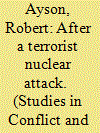

|
|
|
|
|
| Publication |
2010.
|
| Summary/Abstract |
It is just possible that a terrorist nuclear attack could catalyze an inter-state nuclear war. The likelihood of a terrorist group gaining access to nuclear weapons is lower than some fear, and terrorists might not use a nuclear weapon as soon as they had acquired one. But if a terrorist group was to explode a nuclear device in a country that was itself armed with nuclear weapons, and especially if that country was in a conflict-prone relationship with another nuclear-armed state, the broader consequences of even a single terrorist nuclear detonation could be much more serious than some assume.
|
|
|
|
|
|
|
|
|
|
|
|
|
|
|
|
| 2 |
ID:
097165
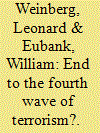

|
|
|
|
|
| Publication |
2010.
|
| Summary/Abstract |
It is widely believed that the current wave of religiously inspired terrorism will persist for the foreseeable future. Is this necessarily the case? This article asserts that this present wave may be cresting, much like previous waves in the modern history of terrorist violence. Further, the article goes on to forecast not an end to terrorism in general, but the likely emergence of still new manifestations of terrorist violence.
|
|
|
|
|
|
|
|
|
|
|
|
|
|
|
|
| 3 |
ID:
097170
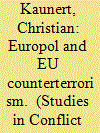

|
|
|
|
|
| Publication |
2010.
|
| Summary/Abstract |
This article offers an analysis of Europol's security actorness in the external dimension of EU counterterrorism. While Europol has attracted some scholarly attention, not so much work has focused on the meaning of its international agreements in counterterrorism. This article aims to investigate the international actorness of Europol at the international level in relation to the fight against international terrorism. It offers original conceptual insights based on empirical case studies of international agreements: Europol agreements with U.S. law enforcement, as well as Europol agreements with countries in the European Neighbourhood policy.
|
|
|
|
|
|
|
|
|
|
|
|
|
|
|
|
| 4 |
ID:
097167
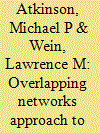

|
|
|
|
|
| Publication |
2010.
|
| Summary/Abstract |
Motivated by the links between terror and crime and the difficulty in directly detecting terror activity, this article formulates and solves a resource allocation problem on overlapping networks to determine if interdiction efforts may be able to take advantage of these connections. The government, knowing only the general structure and overlap of the networks, allocates its scarce resources to investigate each terror and criminal network. There are two stages to the investigation: an initial investigation of all nodes (i.e., terrorists or criminals) and a secondary investigation of criminals identified during the initial investigation to determine if they are terrorists. Applying the model to data derived from a population of terrorists in the United States between 1971-2003 suggests that the government may be able to exploit the terror connections of crimes that are relatively uncommon, somewhat easy to detect, and are attractive to terrorists.
|
|
|
|
|
|
|
|
|
|
|
|
|
|
|
|
| 5 |
ID:
097166
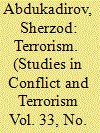

|
|
|
|
|
| Publication |
2010.
|
| Summary/Abstract |
The view of terrorists as entrepreneurs is not new. Yet, unlike traditional entrepreneurs, they are not motivated by profits. This article argues that terrorists are social entrepreneurs. They are motivated primarily by social returns. Furthermore, their main output is a public good due to its non-rival and non-excludable properties. Using social entrepreneurship theories, this article presents an alternative view of the incentives behind the formation of terrorist organizations. It concludes with a discussion of policy implications of this framework for combating terrorism.
|
|
|
|
|
|
|
|
|
|
|
|
|
|
|
|